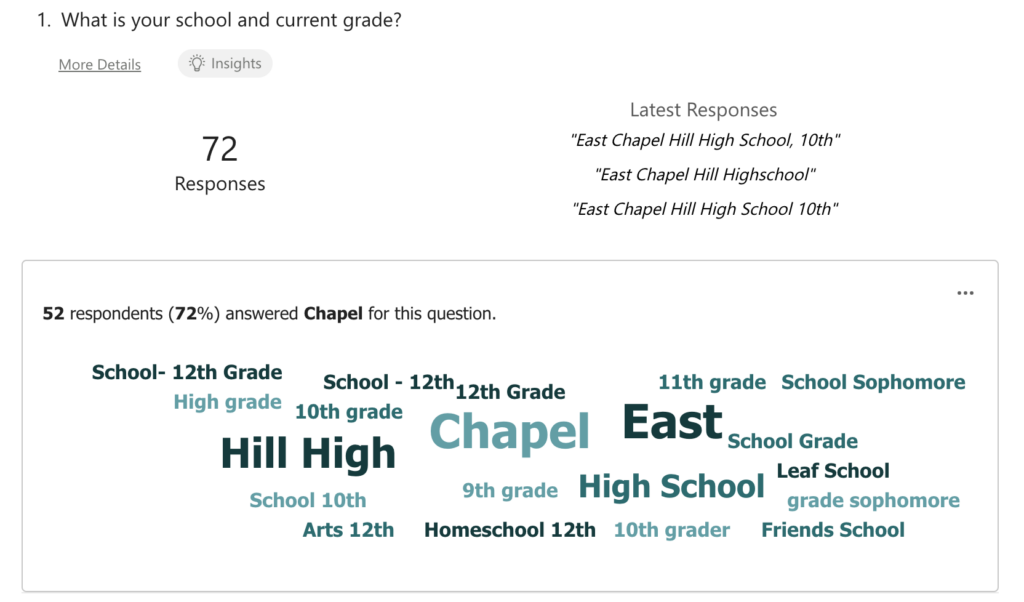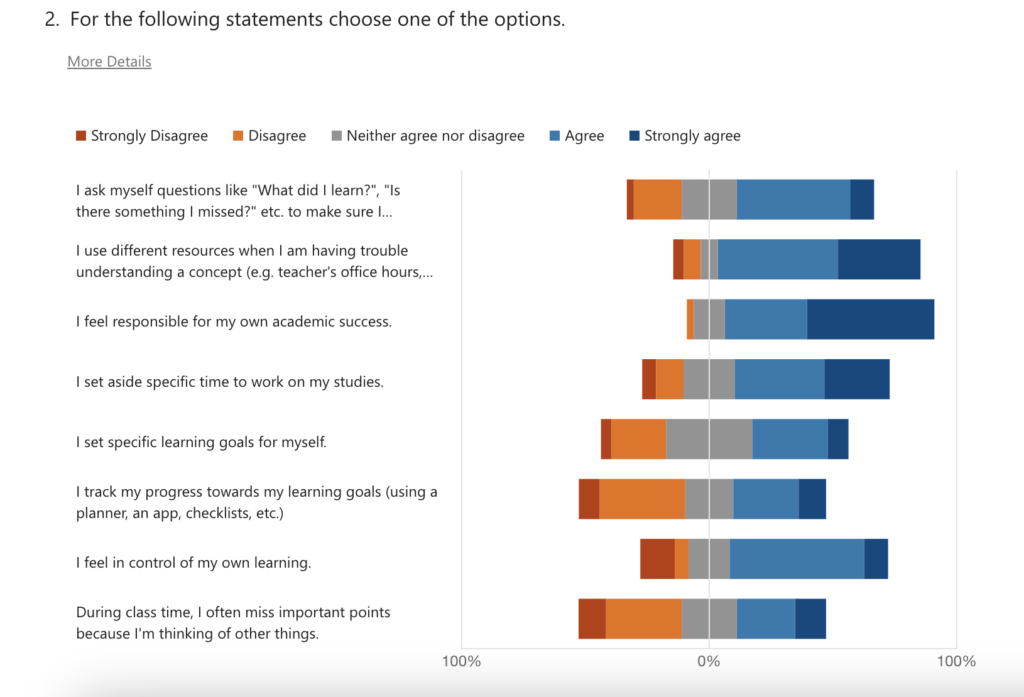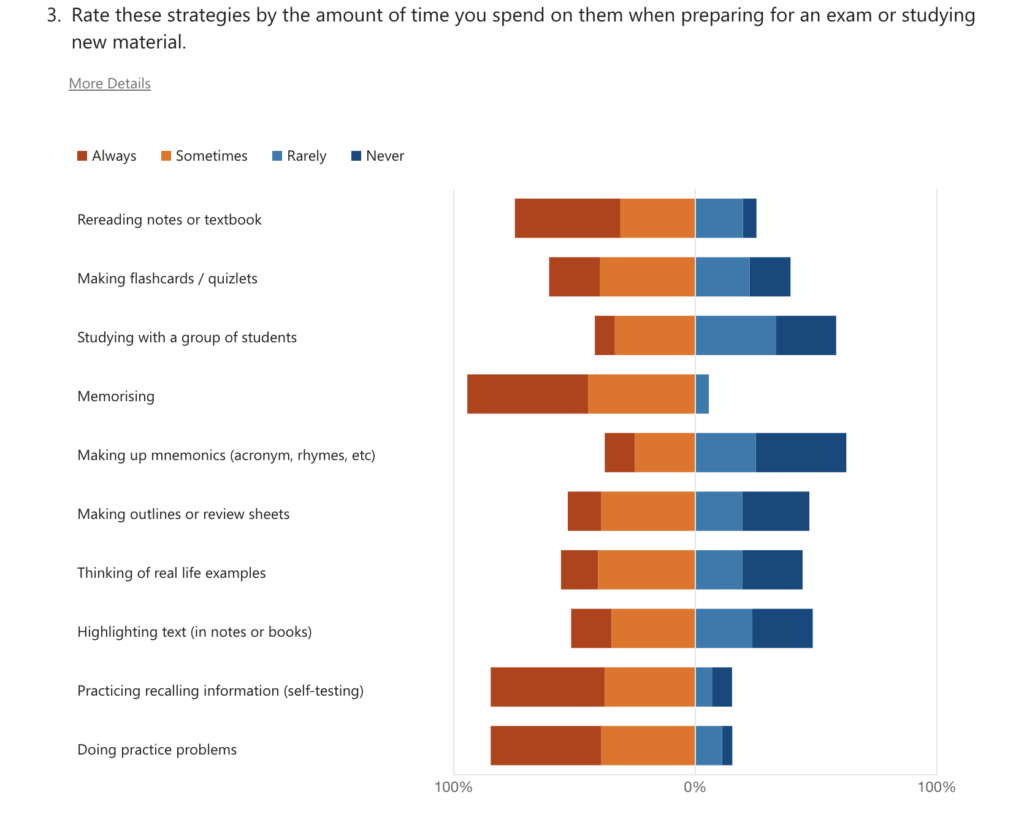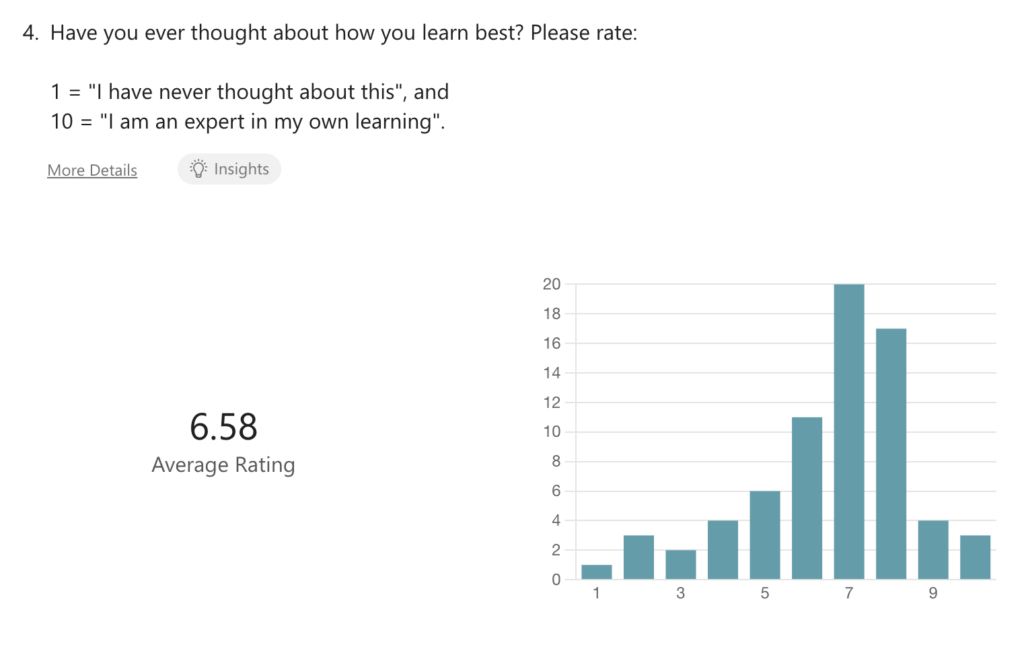Contents [hide]
- 1 Problem
- 2 Target Learners
- 3 Hypothesis
- 4 Data Collection Process
- 5 Major Findings (Analysis of Data)
- 6 Learning Goals
- 7 Survey Questions
- 7.1 Question 1: What is your school and current grade?
- 7.2 Question 2: For the following statements choose one of the options.
- 7.3 Question 3: Rate these strategies by the amount of time you spend on them when preparing for an exam or studying new material.
- 7.4 Question 4. Have you ever thought about how you learn best? Please rate:
- 7.5 Question 5. How do you think you learn best in the classroom (eg. working in a group, seeing visual representations, hearing things multiple times, having independent processing time)? Respond with at least 2 sentences.
- 7.6 Question 6. The most important factor in my academic success is…
- 7.7 Question 7. What is your GPA so far?
- 8 Survey Results
Problem
High school students often struggle with self-regulation skills and lack motivation, engagement, and self-directed learning abilities. They often fail to learn effectively and successfully to achieve their learning goals because they do not apply the efficient learning strategies.
Target Learners
Our target learners are high school students in the United States who lack confidence in their learning ability and are eager to figure out the ways to learn efficient learning strategies and improve their learning outcome.
Hypothesis
Among the large number of factors contributing to student achievement, high motivation, engagement and self-directed learning can be the factors that influence students’ performance. According to the research 1, self-directed learning is strongly associated with academic achievement as measured by GPA (Carson, 2012).
In addition, the learning strategies commonly used by high school students may not be effective in improving their learning outcome. This might lead to students’ poor performance. For example, it was found that the rereading strategies frequently used by students had no effect on learning in educational contexts (Dunlosky et al., 2013). We designed a survey to investigate possible problems regarding students’ study habits and abilities and their application of learning strategies and collect 72 results.
Data Collection Process
The data in this survey was collected through the use of a Microsoft Form that was distributed to students in grades ranging from grade nine to twelve. There were a series of seven questions that asked students a variety of questions. The first question asked the students to report their school and grade level. The second question posed eight statements that the students were to select strongly disagree, disagree, neither agree nor disagree, agree, and strongly agree. The third question was a rating of the time allocated to the strategies used by students when preparing for an exam or studying new material through selecting always, sometimes, rarely, or never. The fourth question asked students to rate on a scale of 1 (I have never thought about this) to 10 (I am an expert in my own learning) if they have ever thought about how they learn best. The fifth question was an open-ended response that asked the students to reflect on how they think they learn best in the classroom. The sixth question asked the students to write about the most important factor in their academic success. The final question asked students to type their GPA in high school.
Grade 9 to Grade 12 students volunteered to finish our survey.
Major Findings (Analysis of Data)
In the survey results, question number 2 had students respond on a scale of agree to disagree. Of the results gathered, it was shown that more than half (51%) of students strongly agree that they feel responsible for their success academically. Considering the idea of goal-setting, students were asked if they set specific goals for themselves. 4% strongly disagree, 22% of the students disagree, 34% neither agree nor disagree, 30% of students agree, and 6% strongly agree. The responses for tracking one’s own academic progress, the responses were close to being split down the middle. Around 42% of the respondents chose the options strongly disagree or disagree and 37% of the students chose the options agree to strongly agree. The respondents revealed through their answers that they feel that they have responsibility for their academic success in school coming in at 80% selecting agree and strongly agree.
Question 4 asked the students to reflect on if they have ever thoughts about how they learn best. On a scale of 1 (I have never thought about this) to 10 (I am an expert in my own learning), the average rating of the participants was 6.58. This is a concerning number to have received because it shows that a large majority of students have not thought about their learning and how they learn in the classroom.
The results of these 72 surveys on learning strategies (Question 3) have shown that students did not effectively regulate their learning through the use of effective learning techniques (Dunlosky et al., 2013). This supports our hypothesis to some extent. Half of them always use the “memorizing” strategy. Concerning the strategies “practicing recalling information (self-testing)”, “doing practice problems” and “rereading notes or textbook”, over 40% of them reported “always”. While practicing recalling information is an efficient learning strategy, rereading notes or textbooks has very limited benefits (Callender & McDaniel, 2009). Concerning the strategies of making flashcards / quizlets, thinking of real life examples, making up mnemonics (acronym, rhymes, etc) and studying with a group of students, only around 15% of them reported they always applied these efficient strategies. The results are shown in the table below.
|
Ranking |
Learning Strategy |
Always |
Sometimes |
Rarely |
Never |
|
1 |
Memorising |
50% |
44.4% |
5.6% |
|
|
2 |
Practicing recalling information (self-testing) |
47.2% |
37.5% |
6.9% |
8.3% |
|
3 |
Doing practice problems |
45.8% |
38.9% |
11.1% |
4.2% |
|
4 |
Rereading notes or textbook |
43.7% |
31% |
19.7% |
5.6% |
|
5 |
Making flashcards / quizlets |
21.1% |
39.4% |
22.5% |
16.9% |
|
6 |
Highlighting text (in notes or books) |
16.7% |
34.7% |
23.6% |
25% |
|
7 |
Thinking of real life examples |
15.3% |
40.3% |
19.4% |
25% |
|
8 |
Making outlines or review sheets |
13.9% |
38.9% |
19.4% |
27.8% |
|
9 |
Making up mnemonics (acronym, rhymes, etc) |
12.5% |
25% |
25% |
31.5% |
|
10 |
Studying with a group of students |
8.3% |
33.5% |
33.3% |
25% |
When asked how they learn best in the classroom in question 5, the majority of students mentioned that they learn best in a group, but some mentioned that they can work effectively only with certain people or at a certain stage (eg. not when studying new material). A lot of people mentioned that they need time to go over new material independently first. A lot of responses mentioned that they are visual learners and learn best with “visual and audio” or “with interactive and visual aspects”. However, these two answers might be so popular because we included them in the question as sample answers. Getting hands-on experience like working in a lab, and doing practice problems were also mentioned often. Another point mentioned by a lot of students was about repetition. They mentioned that they like hearing things multiple times and in different ways.
For Question 6, many students mentioned some important factors that could lead to better academic performances and achievements, most students thought that teachers and motivations are the most important factors for their good performance. 24.3% of students mentioned a good teacher could bring them more confidence in studying, 21.4% of students talked about motivation. They performed well when they had good motivations and confidence to succeed in their studying. Some students also mentioned dedication and efforts. They thought their efforts on one subject could be an important factor in good learning outcomes. In additions to the factors above, another factor that we could notice was the grades/scores of students, though we don’t have their accurate GPAs, we could see it from students’ replies, 15.7% of students mentioned scores or grades in their feedback
Our another hypothesis was that the level of learning skills that high school students have could affect their GPA. However, the data that we collected did not show a clear dependency. For example, even students with lower GPAs responded that they: 1) feel in control of their own learning; 2) feel responsible for their academic success; 3) use a number of efficient learning strategies on a regular basis; 4) reflect on how they learn best.
Thus, even though we did not find clear evidence of GPAs being heavily affected by the level of learning skills, we found that:
Overall, some major factors that influenced students’ learning motivations are good teacher instructions, motivations and confidence, and their dedication in one subject. Scores are also an important factor to consider. Students in this survey still rely a lot on their teachers and motivation is important for their learning processes. The major problem that is still present amongst these students is how the majority of students are able to reflect on their learning but do not consider themselves an “expert” in understanding how they learn and how to develop their learning. When it comes to learning strategies, many students are using memorizing and self-testing to construct their knowledge systems. Both are pretty traditional learning strategies to start and they could easily get access with. Regarding some other effective learning techniques, only a very low percentage of students use them, and a high percentage of students chose “always”, for example, for “rereading notes or textbooks”, which is a relatively low effective learning technique.
Learning Goals
- High school students will be able to apply ICAP Framework to improve their learning performance and motivation.
- High school students will be able to improve their self-efficacy and spark their interest in life long learning.
- High school students will report increased levels of self efficacy in their learning to their teachers at the end of the academic year.
Survey Questions
Question 1: What is your school and current grade?
Question 2: For the following statements choose one of the options.
| Strongly Disagree | Disagree | Neither agree nor disagree | Agree | Strongly agree | |
| I ask myself questions like “What did I learn?”, “Is there something I missed?” etc. to make sure I understand the material I have been studying in class. | |||||
| I use different resources when I am having trouble understanding a concept (e.g. teacher’s office hours, online resources, textbooks, notes, asking a classmate, etc.) | |||||
| I feel responsible for my own academic success. | |||||
| I set specific learning goals for myself. | |||||
| I track my progress towards my learning goals (using a planner, an app, checklists, etc.) | |||||
| I feel in control of my own learning. | |||||
| During class time, I often miss important points because I’m thinking of other things. |
Question 3: Rate these strategies by the amount of time you spend on them when preparing for an exam or studying new material.
| Always | Sometimes | Rarely | Never | |
| Rereading notes or textbook | ||||
| Making flashcards / quizlets | ||||
| Studying with a group of students | ||||
| Memorising | ||||
| Making up mnemonics (acronym, rhymes, etc) | ||||
| Making outlines or review sheets | ||||
| Thinking of real life examples | ||||
| Highlighting text (in notes or books) | ||||
| Practicing recalling information (self-testing) | ||||
| Doing practice problems |
Question 4. Have you ever thought about how you learn best? Please rate:
1 = “I have never thought about this”, and
10 = “I am an expert in my own learning”.
| 1 | 2 | 3 | 4 | 5 | 6 | 7 | 8 | 9 | 10 |
Question 5. How do you think you learn best in the classroom (eg. working in a group, seeing visual representations, hearing things multiple times, having independent processing time)? Respond with at least 2 sentences.
Question 6. The most important factor in my academic success is…
Question 7. What is your GPA so far?
Survey Results



5. How do you think you learn best in the classroom (eg. working in a group, seeing visual representations, hearing things multiple times, having independent processing time)?
- I would say I usually work best when working collaboratively with people that I know and like. I dislike doing such work with people that I don’t know/like because I feel that learning as a group with friends who also want to learn helps me understand the content better.
- I probably work best with seeing visual representations. I also am able to work in groups, but only with certain people
- Hands on
- I work best with visual and audio. I appreciate humor, it helps, and connecting topics to the larger picture. I make my notes colorful and draw illustrations.
- I learn best with interactive and visual aspects. Such as experiments and visual projects, I rarely learn when having someone speak at me or lecture.
- Working in a group on hands on problems. As well as working back and forth with others especially the teacher.
- I typically learn best by working on my own, then listening to what others have come up with to apply it with what I have figured out. By mixing other’s knowledge with mine, I am typically able to learn the most efficiently.
- I work best by hearing the information and simultaneously writing down let aspects. Then I will practice with the crutch of my notes, and once i feel confident, practice more without access to my notes.
- With a teacher who gives examples and has clear expectations and tells you what you need to take notes. The group would be made of my friends.
- Seeing visual representations, as well as taking notes. Keeping track of my thoughts on paper helps me understand and recall the material.
- Working in a group. Being hands on
- Working through examples with independent processing time helps a lot. Working in a group helps some, but I find I can’t learn new concepts too easily in a group. What helps me solidify concepts is when I have a grasp on them, and I can explain them to other people in a group.
- I need clear directions, not too many distractions, and am definitely a visual learner. I am also sometimes a audiotory learner, but visual with clear instructions works. A lot of the time I don’t understand how to do something cause I don’t understand why it happens, for example, in biology, I have to know why cells preform photosynthesis and if I don’t get it then I typically never get the “Right answer”.
- I dont know, but I like labs so i can learn and apply what i have learned.
- I work best in groups. This helps me learn best
- I learn best when the teacher is actively teaching the given topic. Working with a group is also nice
- Getting the information from the teacher and then applying the info in an assignment or a project.
- Seeing visual representations along with working groups work best for me.
- I learn best when working in groups. I don’t like when they lecture a bunch.
- I learn best with hearing things multiple times. I also do well by doing repeated practice problems.

Access the full document of the results of Question 5
6. The most important factor in my academic success is…
- being able to remember the information after a long period of time (something I struggle with) (especially remembering math, even though I’m good in short term)
- Taking advantage of my resources
- Not failing
- Motivation
- Getting good grades to get into a successful school
- Focusing on what I am doing as long as I don’t get distracted.
- How motivated I am to learn
- Stress level
- Grades/ collage acceptance
- Whether or not I can keep track of what assignments and tasks I need to complete.
- Motivation
- A good teacher with a class with preferably good but any structure.
- Clear directions Having
- Ms.Berge as my teacher.
- If my teacher is good
- Not stressing yourself out too much.
- My grades
- My drive and determination and my horrible teacher who is holding me back.
- Not cramming things
- Good teachers who care about me, and are able to support me and uplift me so that I can be a functioning student.
Access the full document of Results of Question 6
References
Carson, E. H. (2012). Self-directed learning and academic achievement in secondary online students. UTC Scholar. Retrieved March 1, 2023, from https://scholar.utc.edu/theses/11/
Callender, A., & McDaniel, M. (2009). The limited benefits of rereading educational texts. Contemporary Educational Psychology, 34(1), 30-41.
Ryan, R. M., & Deci, E. L. (2000). Self-determination theory and the facilitation of intrinsic motivation, social development, and well-being. American Psychologist, 55(1), 68–78. https://doi.org/10.1037/0003-066x.55.1.68
Conley, D. T., & French, E. M. (2014). Student Ownership of Learning as a Key Component of College Readiness. American Behavioral Scientist, 58(8), 1018–1034. https://doi-org.libproxy.lib.unc.edu/10.1177/0002764213515232
Dunlosky, J., Rawson, K. A., Marsh, E. J., Nathan, M. J., & Willingham, D. T. (2013). Improving Students’ Learning With Effective Learning Techniques: Promising Directions From Cognitive and Educational Psychology. Psychological Science in the Public Interest, 14(1), 4–58. https://doi-org.libproxy.lib.unc.edu/10.1177/1529100612453266